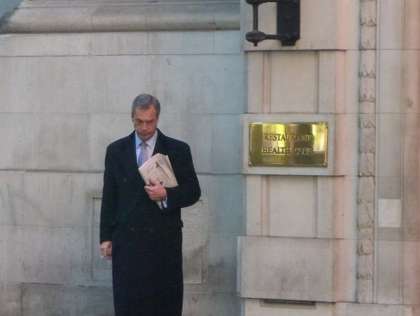
With one week to go before the European elections, each party leader will suffering from a differing degree of nerves.
David Cameron will be the most relaxed. The Conservative spin machine has managed expectations well; if the party were to finish a poor a third it would come as no surprise. The internal and external post-mortems would hardly be enjoyable, but certainly not devastating either.
One poll for the Guardian newspaper suggests the Tories will do much better than expected, even as well as winning the whole thing. That may well be an outlier, though it is not by any means impossible that Cameron could end up with a half-decent result. Either way, it would take an unmitigated disaster for the Tory performance to be the main story when the numbers come in. The Prime Minister is the leader with the least to worry about.
Next on the fear scale is Nick Clegg. The worst case scenario for him is that the Liberal Democrats have all of their MEPs wiped out. That outcome would be both apocalyptic and hilarious (depending on where you stand), and is not an impossibility. If that were to happen, Clegg would face a significant backlash from his party at a grassroots and senior level. The leader would be held responsible for so many loyal party servants losing their jobs, and it would serve as a final warning before the LibDems’ 2015 campaign.
Someone – probably Tim Farron – might try to stage a leadership coup. But the Coalition-sceptics in the party would face the same question they have faced since 2010: who do we have better than Clegg? A truly terrible result would be dangerous for the Lib Dem leader, though he should make it to 2015 providing his party does not completely disappear.
Given the events of recent weeks, the Euros arguably put Ed Miliband in greater danger. The Labour Party’s messaging recently has been a joke. Its poster and video campaigns have been widely derided and party insiders are briefing against their leader at an ever-increasing rate. Now it approaches a mid-term election that really, as the opposition party, it should be winning. Losing first place to UKIP would be a poor result for Labour, albeit expected. Losing to the Tories would be a direct challenge to Miliband’s leadership.
The Guardian/ICM poll had Labour in third. If, somehow, that were to come true, Miliband would have some job on his hands convincing his own party he is the man to lead them into the general election. Labour must come second at worse, or the Labour leader’s job is on the line, even this close to 2015.
Nick Clegg’s MEPs could all be wiped out. Ed Miliband could face mutiny. But the leader with the most cause for anxiety ahead of next week’s election is Nigel Farage. May 22nd is UKIP’s defining moment.
The party is hoping to come in first place. This seems the most probable outcome judging by most of the polls. Crucially, UKIP’s support is also more entrenched than that of the other parties. Of those certain to vote, UKIP consistently has the strongest support by some distance. If that does happen the party has the chance to push on and, as they love to keep telling us, “cause an earthquake” in Westminster. The Newark by-election two weeks further on might even see a post-Euros bounce and Roger Helmer packing his bags for parliament. Then Farage himself would have a good shot at winning a seat in 2015.
Or UKIP could come second to Labour. This is quite possible if Labour manages to secure the level of support it should be as the opposition party. That would not really be good enough for Farage. The earthquake he promised would have been a mere tremor. The revolution of the ‘People’s Army’ would have been beaten down by the people themselves. Second to Labour would not be a horrendous result by any means, and still admirable for a minor party. But it would not be enough, and might well be the beginning of the end.
The other possibility is that UKIP could finish behind the Tories. This is the prediction of that Guardian/ICM poll, and will have set off alarm bells in the party’s HQ. If UKIP cannot even beat the Tories in Europe, on their home turf, then it’s all over. What would be the point of UKIP carrying on if it cannot convince more people to vote for its Europe policy than that of the Tories. If he finishes behind David Cameron, Nigel Farage will have to resign. There would be no way back.
May 22nd is UKIP’s election. The party can come out of it as the victor, it could disappoint, or it could be the end of the show. Seven days to go.

COMMENTS
Please let us know if you're having issues with commenting.